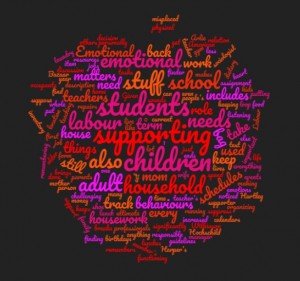The end (of January) is here. Thankfully. I thought wrapping up 2019 would have signaled my surrender. I didn’t know another white flag needed to be waved so quickly, but here goes.
The month of January has been particularly trying on my mental health and well being. When I say my mental and health and wellbeing, it’s important to know that it implies the way a lot of my colleagues in education are feeling right now. It’s tough sledding right now. Let me explain what’s been going down.
The usual demons
The entire month has elapsed as a slow motion dream sequence of continually compartmentalized interactions. Meet here, teach now, listen here, discuss there, teach again, receive devastating news, listen, meet, teach, share, support, listen some more, put on a brave face, teach, weep for a student lost in a senseless act, grieve, cope, support, listen even more, meet, teach, and try to make sense of what the heck happened?
I’d like to blame Mother Nature for the storms, poor commutes, and frigid school days, but I can’t because I bought snow tires which ensured that the weather would only be bad on weekends this month. I’d like to say it’s the flu, but I can’t because I got my first flu shot in 10 years. I’d like to say that my students are being difficult, but I can’t because they are truly interesting and engaging learners.
So it’s got to be me right? I’ll own my part of things knowing that I am sharing with 7.2 billion others in January right now. Let me reiterate. It’s been an incredibly difficult month even though my usual January demons were uncharacteristically co-operative? Now that the month is over things can get better right? Either that, or something really bad is in store for the future once the demons get back from vacation. Fingers crossed, salt over my left shoulder, ladders put away, black cats all in their homes, and artificial rabbit’s foot rubbed something more positive is possible. Anything will be better than the start of 2020.
This January’s tragic events were completely out of our hands. Yet, as teachers, we were all working together in support of our students, as well as one another. At my school, the death of a student on UIA Flight 752 was devastating. Upon confirmation of the news, it was as if the air had been taken from our lungs in a flash. It was hard to breath that day. We were all in shock, and had to put on a strong face for our students and each other as the news unfolded which was not easy.
We are told to try and return things to normal as quickly as possible, but all I remember is feeling numb in the weeks that followed. I wonder how normal I looked trying to hide how it hurt to lose a student? In fact it has taken me a few weeks to even process the feelings in order to share them here.
Despite, therapy dogs, social worker support, and incredibly kind admin/school board officials it has been one of the toughest times I’ve ever experienced as a teacher. When tragic and senseless events occur the losses are hard to overcome regardless of the supports in place. Finding “normal” again would have been very tough without help, but isn’t enough in itself. This leaves many of us having to manage some of the restoration on our own outside of school.
Setting aside a bit of quiet time to process each day helped. As simple as that sounds, it is hard to shut it all down at the end of the day or over the weekends. Taking time to remember the good things and dwell for some time on positive memories helps healing to begin. Sometimes laughter helps too. Especially, when the humour comes in the form of a joke, a meme, or a witty remark. Thank God for animal videos and Reddit.
As teachers we live and breath our callings. Our learners occupy a huge space of our thoughtlives. We have them with us as we process our days whether we are at school or not. There have been countless times where I’m reminded of a student, past and present, in a casual conversation with friends or family. The life of an educator guarantees that you will accumulate some incredible memories, and this is largely a good thing. For me there has been so much joy in reflection back on 2019, but in contrast comes a much harsher start to 2020 with the loss of a beautiful soul from our school family. As February takes over the calender, I am glad to say the end(of January)is here.
Wishing you all health, happiness, and good memories for the rest of the year and beyond.

